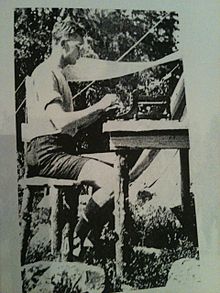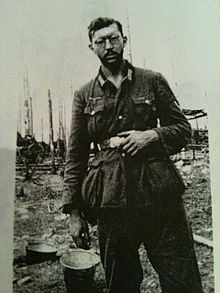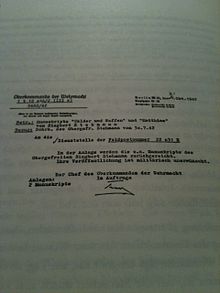Siegbert Stehmann
Siegbert Stehmann (born April 9, 1912 in Berlin , † January 18, 1945 at Koralla in the Brzeskow-Mowo district ) was a German Protestant pastor and poet .
Life
Childhood and youth
Siegbert Stehmann was the son of the teacher Wilhelm Stehmann and his wife Elfriede née Bahlow. He grew up in Berlin and graduated from high school in the gray monastery in 1930 .
Theological and ecclesiastical training
He studied theology in Berlin and Tübingen from 1930 and joined the Confessing Church in 1933 . One of the peculiarities of his biography is that he remained a member of the SA despite his sharp rejection of the German Christians . On April 26, 1935, at an event of the German Faith Movement in the Berlin Sports Palace , tumultuous riots broke out between members of the SS and a group of Christians present, including Stehmann. Stehmann was knocked down and had to be hospitalized. On April 29, Stehmann wrote an open letter to the leader of the faith movement, Count von Reventlow , in which he sharply raised the question of whether Christians still had a place in the new Germany of the Third Reich . This letter caused quite a stir and called the Gestapo onto the scene, which Stehmann summoned for interrogations several times.
As a result, he distanced himself more and more from the National Socialist state. On May 27, 1936, Stehmann passed the first theological exam with the preliminary leadership of the Confessing Church in Berlin-Brandenburg (VLK) . From August to September 1937 he was imprisoned for his intransigence in church politics.
In January 1937, Stehmann took up the vicariate in Templin and Fehrbellin . He was temporarily assigned to the superintendent Günther Harder .
In the winter of 1937/38, Stehmann took part in a seminary of the Confessing Church in Naumburg am Queis until it was closed by the Gestapo.
On December 7, 1938 graduated Stehmann the Second Theological Examination and was in the December 14, St. John's Church in Berlin- Lichterfelde ordained .
From 1939 he worked for the Evangelical Press Association for Germany as a theological assistant and for the Eckart publishing house in Berlin-Steglitz . He was a member of the Eckart Circle , which soon made friends and a. with Kurt Ihlenfeld , Reinhold Schneider and Rudolf Alexander Schröder .
On February 17, 1940, Stehmann married Elfriede Dalchow . At the beginning of 1941, his wife gave birth to a child who only lived ten hours. Matthias Stehmann was born on June 11, 1943 . Elfriede Veit-Stehmann died on July 28, 2012 in Rethen near Hanover.
Military service in war
In 1940 Stehmann was drafted into the Wehrmacht and transferred to Norway as an occupying soldier. From July 1941 he was deployed as an infantryman on the Finnish - Russian front . His troops were subordinate to Field Marshal Carl Gustaf Emil Mannerheim and fought in East Karelia . On November 9, 1942, he was wounded and transferred to a hospital , from there in January 1943 to Oslo and later to Bad Polzin in Western Pomerania .
In October 1942, the Wehrmacht High Command rejected a request made by Stehmann in July of the same year to publish his writings Matthias und Wälder und Waffen on the grounds that it was “militarily undesirable”.
From August 15, 1943 to spring 1944, he took part in officer training. In May 1944, Stehmann visited Rudolf Alexander Schröder one last time while on home leave, before he was deployed to the front in Bessarabia on May 15 , where he was wounded again. In the hospital there was another encounter with Helmut Gollwitzer , whom Stehmann knew from the days of the Dahlem Confessional Synod in 1934 and with whom he was loosely friends.
In 1944 he was denounced by a Nazi command officer for " undermining military strength ". The following court martial was set, but he was transferred to the fighting force.
death
He fell on January 18, 1945 near Koralla in the Brzeskow-Mowo district. (The indication Nidden on the Curonian Spit is probably wrong .)
reception
literature
Stehmann's fate (which he himself foresaw and described in the prose story Matthias in the partly autobiographical figure of Matthias Wunzel ) is literarily processed in Kurt Ihlenfeld's novel Wintergewitter from 1951.
Theology and literary studies
Scientific research on Stehmann is still pending. In 2003, Marion Heide-Münnich presented a work (see under “Literature”) which is oriented towards literary theology and which is conceptually similar to Friso Melzer's project of Protestant literary studies, which has remained fragmentary .
Since the summer of 2011, a doctoral project by the Protestant pastor David Last on language theological issues of Stehmann's spiritual poetry has been running at the Wuppertal Church University of Applied Sciences, accompanied by Johannes von Lüpke .
Works
Individual works (during lifetime)
- Shepherd's Game (poems), 1935
- Spiritual Circle (Poems), 1937
- Song and Confession (contribution to the festschrift for Rudolf Alexander Schröder on his 60th birthday), 1937
- Abgesang (poem), in: Eckart 13/1937, p. 464
- The seven missives (a spiritual poem dedicated to Rudolf Alexander Schröder), 1939
- Wache am Mjösa (poem), in: Eckart 16/1940, p. 240
- Feldweihnacht (poem), in: Eckart 16/1940, p. 319
- Hold on tight - a guide from God's word. Designed by Rudolf Alexander Schröder, Jochen Klepper and Siegbert Stehmann, 1940
- The parish mirror (edited by Siegbert Stehmann), 1940
- Finland 1941 (Five Poems), in: Eckart 17/1941, pp. 195–196
Individual works (posthumous)
- I'm deep in the ground ... Gen Abend (poems), in: Praise from the depths. Young sacred poetry, Göttingen 1947, pp. 102-104
- The parable, Berlin 1955
Compilations (posthumous)
- Sacrifice and Change, Witten and Berlin 1951
- Burning years. Poems, prose, diaries, 1st edition, Witten and Berlin 1964, 2nd, modified edition, Bielefeld 1983
- We hide the bitterness. Field post letters 1940–1945, ed. by Gerhard Sprenger, Hannover 1992
literature
- Marion Heide-Münnich: Siegbert Stehmann: media in vita - media in morte; a contribution to Siegbert Stehmann's poetry from the years 1939 to 1945. Hamburg: Kovač 2003 (Writings on the history of literature; Vol. 5) ISBN 3-8300-0905-4
- Rudolf Wentorf: Siegbert Stehmann. A poet on probation . Fountain publishing house. Gießen, Basel 1965 (= vol. 169 of the collection: "Witnesses of the present God")
- Wolfdietrich von Kloeden : Stehmann, Siegbert. In: Biographisch-Bibliographisches Kirchenlexikon (BBKL). Volume 14, Bautz, Herzberg 1998, ISBN 3-88309-073-5 , Sp. 1527-1529.
Individual evidence
- ↑ | Biographical data in the description of Kurt Ihlenfeld's grave of honor ( page no longer available , search in web archives ) Info: The link was automatically marked as defective. Please check the link according to the instructions and then remove this notice.
- ↑ Stehmann to his wife: "I wish to be able to give you a true picture of our distant life in the 'story' that emerges so slowly and lonely. Even in the finished parts it would say a lot of unspeakable things, such as letters and Withhold reports (we keep silent about the bitterness, pp. 170f.)
Web links
- Literature by and about Siegbert Stehmann in the catalog of the German National Library
- Stehmann on kirchengeschichten-im-ns.de , radio play (PDF; 777 kB), first broadcast on SDR 2 on May 4, 1990
| personal data | |
|---|---|
| SURNAME | Stehmann, Siegbert |
| BRIEF DESCRIPTION | German Protestant clergyman and poet |
| DATE OF BIRTH | April 9, 1912 |
| PLACE OF BIRTH | Berlin |
| DATE OF DEATH | January 18, 1945 |
| Place of death | Nidden |



